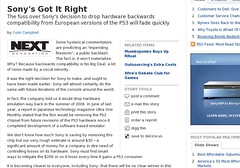Sony is making their PS3 move.
I totally agree with the move that Sony is making by stripping out the hardware backward compatibility function in the PS3. It should not come as a surprise to anyone who has followed the development of the PS2. They did the same thing with PS1 backward compatibility when the PS2 came out.
For those who're not in the know, the PS3 comes with hardware compatibility with the PS2. This meant that both machines were actually implemented inside the casing of the PS3 in hardware. This results in higher production costs, higher power consumption and higher heat dissipation. None of these things make sense except when you consider that they were under pressure to push a console out. The Xbox had already been ahead by a year and Wii was going to trash them in their home market.
Once Sony had started to make some progress with a software emulator, they would strip out the hardware compatibility. However, there will be some things that the software emulator cannot do quite well. So, some games may experience problems. The new PS3 Cell certainly has enough computing power to emulate a lot of PS2 functions in software. The same is being done by the XBox and Wii.
This step is good for both Sony and the consumer. Sony will lose less money by reducing their BOM costs. Consumers will benefit by having a more efficient console. Cheaper manufacturing costs will ultimately result in a cheaper PS3 in the future. Also, in a couple of years time, we may even see a 'slimline' PS3 version like we saw for the PS2 after they've stripped everything down.
This shows a very important difference in the three major console companies. Nintendo is an innovator. They have always been that way and have brought us some of the most memorable games and machines in the past. Sony is a strong hardware manufacturer. They have always banked on their manufacturing expertise to get cheaper and better hardware out the door. Microsoft is a savvy marketeer. They have depended on their massive warchest to out-market and out-manouvre their competition.
Finally, any hardcore gamer who still wants to play PS2 games can cheaply buy a new PS2 machine for only 50 quid. So, it's really hardly any extra cost. In fact, it might be preferable to getting a seperate PS2 as it would consume less power than an integrated PS2 inside the PS3.
For those who're not in the know, the PS3 comes with hardware compatibility with the PS2. This meant that both machines were actually implemented inside the casing of the PS3 in hardware. This results in higher production costs, higher power consumption and higher heat dissipation. None of these things make sense except when you consider that they were under pressure to push a console out. The Xbox had already been ahead by a year and Wii was going to trash them in their home market.
Once Sony had started to make some progress with a software emulator, they would strip out the hardware compatibility. However, there will be some things that the software emulator cannot do quite well. So, some games may experience problems. The new PS3 Cell certainly has enough computing power to emulate a lot of PS2 functions in software. The same is being done by the XBox and Wii.
This step is good for both Sony and the consumer. Sony will lose less money by reducing their BOM costs. Consumers will benefit by having a more efficient console. Cheaper manufacturing costs will ultimately result in a cheaper PS3 in the future. Also, in a couple of years time, we may even see a 'slimline' PS3 version like we saw for the PS2 after they've stripped everything down.
This shows a very important difference in the three major console companies. Nintendo is an innovator. They have always been that way and have brought us some of the most memorable games and machines in the past. Sony is a strong hardware manufacturer. They have always banked on their manufacturing expertise to get cheaper and better hardware out the door. Microsoft is a savvy marketeer. They have depended on their massive warchest to out-market and out-manouvre their competition.
Finally, any hardcore gamer who still wants to play PS2 games can cheaply buy a new PS2 machine for only 50 quid. So, it's really hardly any extra cost. In fact, it might be preferable to getting a seperate PS2 as it would consume less power than an integrated PS2 inside the PS3.













No comments:
Post a Comment